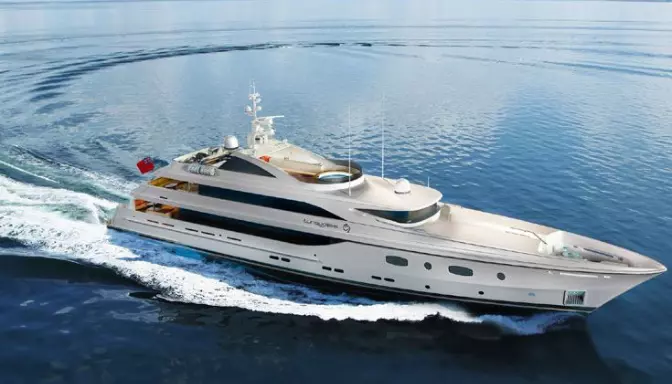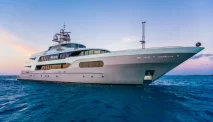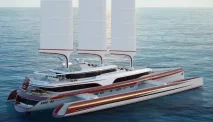Factors to Consider When Choosing a Yacht
Now that you know the different types of yachts and their pros and cons, you need to consider some factors that will help you narrow down your options and find the best yacht for you. Here are some of the most important factors to consider when choosing a yacht:
Budget
Your budget is the most obvious and crucial factor to consider when choosing a yacht, as it will determine what kind of yacht you can afford and what kind of expenses you can expect. The price of a yacht depends on many factors, such as size, type, age, condition, features, and location. Generally, the larger, newer, and more luxurious the yacht, the more expensive it will be.
However, the price of a yacht is not only the initial purchase cost, but also the ongoing costs of owning and operating a yacht. These include:
- Maintenance: This includes the regular servicing, cleaning, and repairing of the yacht and its systems, as well as the periodic refitting, upgrading, and refurbishing of the yacht and its features. Maintenance costs vary depending on the type, size, age, and condition of the yacht, as well as the frequency and quality of the service. Maintenance costs can range from a few thousand to several million dollars per year.
- Operation: This includes the costs of fuel, water, electricity, and other consumables that are required to run the yacht and its systems. Operation costs depend on the type, size, and performance of the yacht, as well as the distance and duration of the voyages. Operation costs can range from a few hundred to several thousand dollars per day.
- Crew: This includes the salaries, benefits, and expenses of the crew members that are hired to operate, maintain, and service the yacht and its guests. Crew costs depend on the number, qualification, and experience of the crew members, as well as the level and standard of the service. Crew costs can range from a few thousand to several hundred thousand dollars per month.
- Berthing: This includes the fees and charges of docking, mooring, or anchoring the yacht at a marina, port, or bay. Berthing costs depend on the size and type of the yacht, as well as the location and availability of the berth. Berthing costs can range from a few hundred to several thousand dollars per night.
- Insurance: This includes the premiums and deductibles of insuring the yacht and its contents against damage, loss, theft, or liability. Insurance costs depend on the value, type, and age of the yacht, as well as the coverage and policy of the insurance. Insurance costs can range from a few thousand to several hundred thousand dollars per year.
- Registration: This includes the fees and taxes of registering the yacht and its ownership under a certain jurisdiction or flag. Registration costs depend on the size, type, and value of the yacht, as well as the jurisdiction and flag of the registration. Registration costs can range from a few hundred to several thousand dollars per year.
As you can see, owning a yacht is not a cheap endeavor, and you need to be prepared and realistic about the costs involved. A good rule of thumb is to allocate at least 10% of the purchase price of the yacht for the annual costs of owning and operating the yacht. For example, if you buy a yacht for $10 million, you should expect to spend at least $1 million per year on the yacht.
Purpose
Your purpose is another important factor to consider when choosing a yacht, as it will determine what kind of yacht you need and what kind of features you want. The purpose of your yacht is the main reason or goal that you have for buying and using a yacht. It can be anything from personal to professional, from recreational to commercial, from practical to emotional. Some of the most common purposes of yachts are:
- Cruising: This is the most common and general purpose of yachts, as it involves traveling the sea for pleasure, leisure, or exploration. Cruising can be done solo, with family, with friends, or with guests, and can range from short trips to long voyages. Cruising requires a yacht that is comfortable, reliable, and versatile, as it needs to adapt to different destinations, conditions, and preferences. Cruising also requires a yacht that has enough space, storage, and amenities to accommodate the crew and the guests, as well as their luggage, equipment, and activities.
- Racing: This is a more specific and competitive purpose of yachts, as it involves participating in sailing competitions or challenges. Racing can be done individually or in teams, and can vary in level, format, and duration. Racing requires a yacht that is fast, agile, and responsive, as it needs to perform well under pressure, speed, and maneuverability. Racing also requires a yacht that has a minimal weight, drag, and resistance, as well as a optimal sail area, shape, and design.
- Chartering: This is a more commercial and profitable purpose of yachts, as it involves renting out the yacht to other people for a fee. Chartering can be done occasionally or regularly, and can target different markets, segments, and niches. Chartering requires a yacht that is attractive, appealing, and marketable, as it needs to attract and satisfy the customers, as well as generate revenue and profit. Chartering also requires a yacht that has a high quality, standard, and reputation, as well as a professional and experienced crew and management.
- Living: This is a more personal and lifestyle purpose of yachts, as it involves using the yacht as a primary or secondary residence. Living can be done permanently or temporarily, and can be motivated by various reasons, such as convenience, privacy, mobility, or adventure. Living requires a yacht that is spacious, cozy, and homely, as it needs to provide the comfort, security, and functionality of a home. Living also requires a yacht that has a low maintenance, operation, and berthing costs, as well as a suitable and convenient location and registration.
As you can see, different purposes of yachts have different implications and expectations for the yacht and its owner. Therefore, you need to be clear and honest about your purpose of buying and using a yacht, as it will help you choose the right yacht for you and avoid disappointment, frustration, or regret.
Size
Your size is another crucial factor to consider when choosing a yacht, as it will determine how much space, comfort, and capacity you will have on board. The size of a yacht is measured by its length, which is usually expressed in feet or meters. The size of a yacht can range from a few meters to over a hundred meters, depending on the type and design of the yacht. Generally, the larger the yacht, the more spacious, comfortable, and luxurious it will be.
However, the size of a yacht is not only a matter of preference, but also a matter of practicality and feasibility. The size of a yacht affects many aspects of owning and operating a yacht, such as:
- Availability: The availability of a yacht depends on how many yachts of that size are on the market and how much demand there is for them. Larger yachts are usually more rare and more sought-after than smaller yachts, which means they are harder to find and more expensive to buy.
- Accessibility: The accessibility of a yacht depends on how easy or difficult it is to access and use the yacht and its facilities. Larger yachts are usually more complex and sophisticated than smaller yachts, which means they require more skill and experience to operate and navigate. Larger yachts also have more restrictions and regulations regarding their docking, mooring, and anchoring, which means they have less options and flexibility for their berthing.
- Affordability: The affordability of a yacht depends on how much it costs to own and operate the yacht and its systems. Larger yachts are usually more costly and resource-intensive than smaller yachts, which means they require more fuel, water, electricity, and other consumables to run. Larger yachts also have more maintenance, operation, crew, berthing, insurance, and registration costs, which means they have more expenses and liabilities.
As you can see, the size of a yacht is not only a benefit, but also a trade-off. Therefore, you need to be realistic and balanced about the size of your yacht, as it will help you choose the right yacht for you and avoid unnecessary or excessive costs and complications.
Style
Your style is another important factor to consider when choosing a yacht, as it will determine how your yacht looks, feels, and functions. The style of a yacht is influenced by its design, layout, features, and decor, which can vary from yacht to yacht, depending on the type, age, and condition of the yacht. Generally, the style of a yacht can be classified into two categories: traditional and modern.
Traditional yachts are yachts that have a classic, elegant, and timeless style, as they follow the principles and conventions of the past. Traditional yachts usually have a wooden or metal hull, a symmetrical and streamlined shape, a simple and functional layout, and a warm and cozy decor. Traditional yachts are ideal for those who appreciate the history, heritage, and craftsmanship of yachting, as well as the charm, character, and nostalgia of the past.
Modern yachts are yachts that have a contemporary, innovative, and futuristic style, as they challenge the norms and expectations of the present. Modern yachts usually have a fiberglass or composite hull, a asymmetrical and angular shape, a complex and versatile layout, and a cool and sleek decor. Modern yachts are ideal for those who appreciate the technology, creativity, and diversity of yachting, as well as the novelty, excitement, and sophistication of the future.
Of course, the style of a yacht is not only a matter of taste, but also a matter of performance and functionality. The style of a yacht affects many aspects of owning and operating a yacht, such as:
- Quality: The quality of a yacht depends on how well the yacht is built, maintained, and serviced, as well as how durable, reliable, and efficient the yacht and its systems are. Traditional yachts are usually more sturdy and solid than modern yachts, as they are made of stronger and heavier materials. However, modern yachts are usually more advanced and refined than traditional yachts, as they are made of lighter and smarter materials.
- Comfort: The comfort of a yacht depends on how spacious, cozy, and luxurious the yacht and its facilities are, as well as how smooth, stable, and quiet the yacht and its systems are. Traditional yachts are usually more spacious and cozy than modern yachts, as they have more room and less clutter. However, modern yachts are usually more luxurious and quiet than traditional yachts, as they have more features and less noise.
- Versatility: The versatility of a yacht depends on how adaptable, flexible, and customizable the yacht and its facilities are, as well as how diverse, varied, and compatible the yacht and its systems are. Traditional yachts are usually more adaptable and flexible than modern yachts, as they have less complexity and more simplicity. However, modern yachts are usually more customizable and compatible than traditional yachts, as they have more options and more integration.
As you can see, the style of a yacht is not only a preference, but also a compromise. Therefore, you need to be aware and selective about the style of your yacht, as it will help you choose the right yacht for you and avoid dissatisfaction, incompatibility, or obsolescence.






